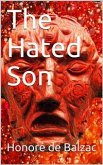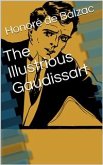Modeste Mignon is a novel by the French writer Honoré de Balzac. It is the fifth of the Scènes de la vie privée (Scenes of Private Life) in La Comédie humaine.
The first part of Modeste Mignon is based on a traditional species of folktale known as La fille mal gardée ("The Ill-Watched Girl"), in which a young woman takes a lover despite the close attentions of her guardians, who are determined to preserve her chastity for a more suitable match. Modeste Mignon, a young provincial woman of romantic temperament, imagines herself to be in love with the famous Parisian poet Melchior de Canalis, whose works have filled her with passion. She corresponds with him, but he is unmoved by her attentions. Canalis invites his secretary Ernest de la Brière to deal with the matter.
Ernest replies to Modeste in Canalis' name; a dangerous intrigue ensues, which sees Ernest appear in Modeste's home town of Ingouville (near Le Havre) disguised as Canalis. The plot is complicated by the interference of Modeste's family and friends, who suspect that she has secretly taken a lover. The wily dwarf Butscha, who loves Modeste as a medieval knight might have loved a lady far above his station, is determined to unmask the man. Things come to a head when Ernest discovers that Modeste's father Charles Mignon has returned from his long exile a very wealthy man: Modeste is no longer a poor provincial girl but a rich heiress with six million francs to her name.
Ernest reveals his true identity, but Modeste feels humiliated and casts him off. When Modeste's true worth becomes generally known, Canalis takes a renewed interest in her and believes that his poetic ardour will enable him to win her heart. But his secretary is no longer his only rival: a local wealthy potentate the Duc d'Hérouville now regards the nouveau-riche Modeste Mignon as a suitable match and throws his hat into the ring.
The second part of the novel is also based on a traditional story-type, The Rival Suitors. Ernest, Canalis and the Duc d'Hérouville are invited to Ingouville to compete for the hand of Modeste. Still smarting from the trick played on her by Ernest, Modeste is determined to choose between the passionate advances of the poet and the prospect of becoming a duchess should she accept Hérouville. Butscha, however, who realizes that Ernest is the one who truly loves her, is equally determined to expose the pretensions of Canalis and promote Ernest's suit. Thanks to Butscha's intrigues and her father's good sense, Modeste chooses Ernest and the two are married.
The first part of Modeste Mignon is based on a traditional species of folktale known as La fille mal gardée ("The Ill-Watched Girl"), in which a young woman takes a lover despite the close attentions of her guardians, who are determined to preserve her chastity for a more suitable match. Modeste Mignon, a young provincial woman of romantic temperament, imagines herself to be in love with the famous Parisian poet Melchior de Canalis, whose works have filled her with passion. She corresponds with him, but he is unmoved by her attentions. Canalis invites his secretary Ernest de la Brière to deal with the matter.
Ernest replies to Modeste in Canalis' name; a dangerous intrigue ensues, which sees Ernest appear in Modeste's home town of Ingouville (near Le Havre) disguised as Canalis. The plot is complicated by the interference of Modeste's family and friends, who suspect that she has secretly taken a lover. The wily dwarf Butscha, who loves Modeste as a medieval knight might have loved a lady far above his station, is determined to unmask the man. Things come to a head when Ernest discovers that Modeste's father Charles Mignon has returned from his long exile a very wealthy man: Modeste is no longer a poor provincial girl but a rich heiress with six million francs to her name.
Ernest reveals his true identity, but Modeste feels humiliated and casts him off. When Modeste's true worth becomes generally known, Canalis takes a renewed interest in her and believes that his poetic ardour will enable him to win her heart. But his secretary is no longer his only rival: a local wealthy potentate the Duc d'Hérouville now regards the nouveau-riche Modeste Mignon as a suitable match and throws his hat into the ring.
The second part of the novel is also based on a traditional story-type, The Rival Suitors. Ernest, Canalis and the Duc d'Hérouville are invited to Ingouville to compete for the hand of Modeste. Still smarting from the trick played on her by Ernest, Modeste is determined to choose between the passionate advances of the poet and the prospect of becoming a duchess should she accept Hérouville. Butscha, however, who realizes that Ernest is the one who truly loves her, is equally determined to expose the pretensions of Canalis and promote Ernest's suit. Thanks to Butscha's intrigues and her father's good sense, Modeste chooses Ernest and the two are married.









